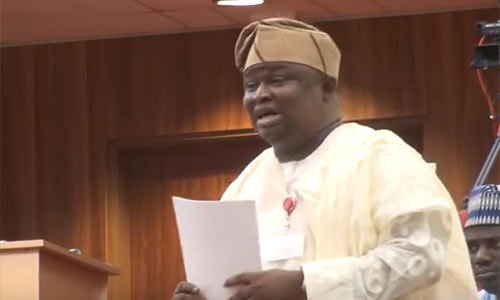COURTROOM NEWS 30/05/2023
Lagos Court Grants Wives Equal Rights over Husbands’ Properties

A Lagos High Court sitting in Ikeja has added a new vista to the rights of women in Nigeria as it declares that wives are joint owners of the properties with their husbands as men hold such properties in ‘constructive trust’ for the family.
The court ruled that “indirect contributions of a wife to the marital property should not be quantified in monetary terms in order to entitle her to a share of the property”.
“Constructive Trust,“ the court said, quoting the English Master of Rolls, Lord Denning, “is a trust imposed by law wherever justice and good conscience require a remedy by which the court can enable an aggrieved spouse or party to obtain restitution and the success of the party’s case does not depend on his or her direct physical or monetary contribution to the building or acquisition of the property.”
Justice Dorcas T. Olatokun made this pronouncement in a case between a couple, Mr. Pius Aina, and his wife, Caroline, over a property at Festac Town, Lagos, acquired by the husband while he worked with the Federal Housing Authority (FHA) in the early 1980s.
The couple who had been married for 35 years live in the property with their three children for more than 30 years.
After his retirement, the husband in 2018 sold the property for N20 million and relocated back to his hometown in Ondo State.
His wife however challenged the sale, claiming that as his wife, and joint owner, the husband cannot sell the property without her consent.
She therefore sued her husband, asking the court to void the sale.
Joined as defendants in the suit are her husband, Mr. Pius Aina, Michael Oluwaseun Da-Silva, Albert Sanyaolu Da-Silva, Joe Vincent, and Femi Adeniyi.
The second and third defendants are the purported buyer of the property, and his father who manages it, respectively.
The two other defendants are the agents that facilitated the sale.
The claimant’s lawyer, Ademola Adesina, argued that his client is legally married to the first defendant for 35 years under the Marriage Act and the marriage is blessed with three children. The first defendant was a staff of FHA and while in employment, he was allocated a two-bedroom bungalow described as House 6, N Close, 3rd, Avenue, Festac Town, where he resided with his family as their residential home.
In 1989, FHA wrongfully and compulsorily withdrew the services of the first defendant and 69 other employees and was asked to vacate the house.
However, the employees challenged FHA in court and they were reinstated on November 24, 1997.
According to the claimant, her husband was eventually retired compulsorily on July 4, 2001, five years after the reinstatement.
FHA gave him a right of first refusal to purchase the property at a price of N400,000. This offer was paid for with the husband’s N200,000 entitlement while the wife paid the balance of N200,000.
The wife further claimed that in 2006, her husband took a loan of N30,000 from Cooperative Bank without her knowledge.
She added that by the time she knew, the loan had accrued interest which took it to N150,000. The husband allegedly used the house as collateral and when they were going to lose the house, the wife claimed that she had to cough out the money to repay the loan.
She also cited another time that FHA sought to revoke the right of first refusal given to the husband due to the fact that he had got another allocation at the Ipaja, Lagos scheme of the authority, which he sold.
FHA position was that the husband is only entitled to one allocation. The wife claimed that her husband challenged FHA in court and won the case.
However, she claimed that she was the one who financed the litigation as she paid the lawyer, Chief M.O.B Omolemen of Messrs Gab-Anna Chambers the sum of N1.5 million as cost of litigation.
She stated further that on December 8, 2018, while on a trip abroad, she discovered that her husband had sold the family home to the second and third defendants without any form of consent from her.
She claimed that the sale was conducted with fake documents as she had the original documents of the house with her. She stated that every attempt to make her husband revoke the sale or render accounts of the sale proved abortive. She therefore urged the court to void the sale.
However, the husband in his defence, stated that the property, the subject matter of the suit is a product of a private contract between him and the FHA.
He argued that the wife is not a party to the contract and therefore, cannot challenge his right to transfer the property to the second and third defendants, particularly in the absence of evidence that she is an assignee to the contract and property.
He further claimed that the statutory marriage between him and his wife was contracted in 2001 during the subsistence of a valid customary marriage between him and his first wife contracted in December 22, 1980.
This fact, according to him, is known to his wife, and therefore, cannot rely on her marriage to him to shortchange him and his first wife.
He stated that he consulted both wives on his decision to sell the house and retire back to his hometown in Ondo State, to which they both consented.
As part of the resettlement plan, the husband stated that he purchased a three-bedroom flat residential apartment for the claimant at Block 147, Flat 2, Amuwo Odofin Low- Cost Housing Estate, Mile 2, Lagos for the claimant and his children.
He also bought a property for himself at Lotogbe Family Layout, Ago Itunu, Ondo-Akure Road for N6.5 million.
He said having derived benefit from the sale to the second defendant, and the claimant having also benefited from the sale, it will be inequitable to deprive the second defendant of his right to peaceable possession of the property being an innocent third party without any notice of disagreement between husband and wife at the time of sale.
He stated that the property was sold for N20 million and denied that the sale was made with fake documents as original documents were handed over to the second defendant at the time of sale.
He claimed that there’s no law that bounds him to take permission from the wife before selling his own house, but out of courtesy, he consulted the wife who did not object to it.
The husband said he subscribed to the housing scheme as part of his employment benefits from his employer, which led to the house being allocated to him. The allocation was formalised and was officially communicated to him via a letter dated October 23, 2017.
He said the allocation papers did not contain any inference to his wife or the three children as joint owners. He denied further that he did not pay N400,000:00 for the property as suggested by his wife but that he paid N3.750 million, which was deducted from his terminal benefit.
He also denied that his wife contributed to the payment of litigation fees from his lawyer, whom he claimed he paid fully. He claimed that he was the one who hired Gab-Anna Chambers and that he fulfilled his contractual obligations to the law firm, which was to the tune of N7.5 million.
In his judgment, Justice Olatokun held that there exists a valid marriage between the claimant and the first defendant, and that both had contributed to the marriage.
“This inference of trust, the one for the other is readily apparent when each has made a financial contribution to the purchase price or the mortgage installment. The financial contribution may be direct as where it is actually stated to be a contribution towards the price or installments. It may be indirect as where both go out to work and one pays for the housekeeping and other the mortgage installments. It doesn’t matter who pays what so long as there is a substantial financial contribution towards the family expenses, it raises the inference of trust. We should not give money right over social justice”.
On the issue of ownership, Justice Olatokun ruled: “Where joint ownership of property exists, it means that each party has an equal proprietary right of ownership in the said land, notwithstanding the weight of contribution made by each party and can jointly exercise such right in respect of the property. The position of the law is settled that where a property is jointly owned, the consent of the other is required before disposing the property.”
In applying the principle of law to this issue, the court found that the defendant cannot dispose of the property without the consent of the claimant first sought and obtained.
The court held that the claimant is entitled to be protected by the court to ensure that the property in dispute is not alienated without her consent and therefore sale of the property by the first defendant to the second defendant is hereby set aside.



